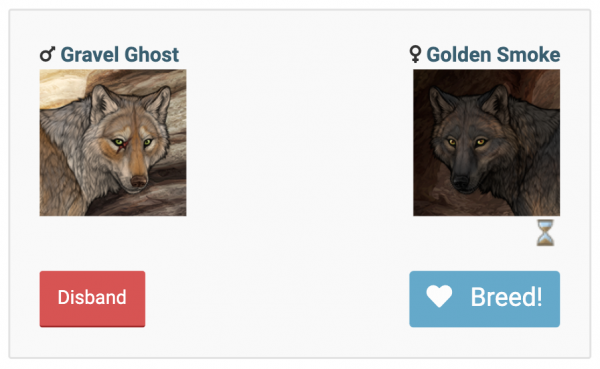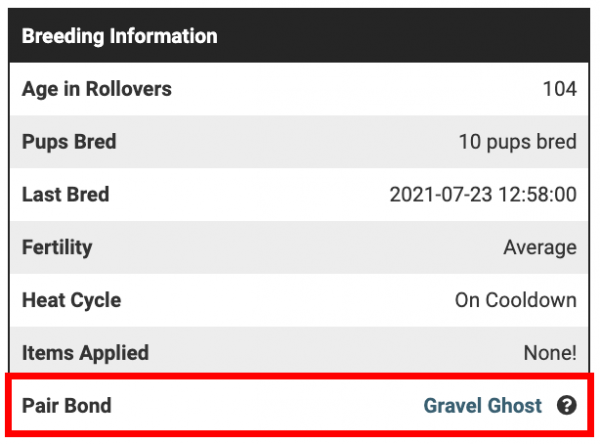Pair Bonds
From Grouse House Wiki
Pair Bonds are a method of breeding which can allow a non-breeding male to have pups! However, the male wolf can only breed with the female in his pair. Pair bonding is unlocked on your 30th rollover, on which the accompanying quest becomes available to you from the [Questing page! Adult wolves can form pair bonds after they have been in your pack for at least 7 rollovers.
You can view all of your current pair bonds on the Pair Lists page, where you can also disband the pair or breed them if both wolves are eligible. There is no limit to the amount of pair bonds you can have in your pack.

Pair bonds consist of two wolves and can be formed regardless of the wolf's sex. Different-sex pair bonds are able to breed when the female wolf is in heat. Same-sex pair bonds are not able to naturally conceive puppies, but any pair bond is able to adopt puppies from the [Enclave]. Wolves can only be in one pair bond at a time, and you cannot trade a wolf that is in a pair bond. Breeding males can also be a pair bond, and they will still be able to breed to any female inside or outside the pack like they are able to normally. Females in pair bonds are also not required to breed to the male in their pair bond- they can breed to a breeding male or an outside stud, as well. If a male in a pair bond is not a breeding male, however, they will only be able to breed to the female in their pair bond.
You can view if a wolf is in a pair bond in the Breeding Information section of their page.

Pair bonds will last until one of the wolf's passes, or until you choose to disband the bond manually. Disbanding a pair bond does not cost anything and can be done on the Pair Lists page. However, after a pair bond is disbanded (whether through death or player choice), both wolves who were in that pair bond will loose all of their Mood. You must play with them quickly before the next rollover to prevent them from leaving your pack. Disbanding a pair bond will also put both wolves on a 30-rollover pair bond cooldown during which they cannot be added to a new pair bond. If a wolf leaves your pack due to neglect, their pair bond will be disbanded. Reclaiming them into your pack does not renew the pair bond, even if both wolves left and were reclaimed at the same time.
Having a lead wolf with the personality Amiable will reduce pair bond cooldowns by a third and half the mood loss suffered after breaking a pair bond, meaning the wolves will only lose 50% mood instead of 100%.
Pair Bond Restrictions
Pair Bond Restrictions
While there is no limit to how many pair bonds you can have, the amount of breedings you can make between pair bonds is restricted based on your territory size. This restriction is not how many pair bonds can be made, but how many breedings can be done by the pair bonds already made. Pair bond breedings are defined by breeding done through the Pair Lists page. If your breeding male is in a pair bond, but you are breeding him from the breeding male page, it will not count towards your monthly limit. Your pair bond breeding count resets on the 1st of every month.
| Pair Bond Breeding Limits | |
|---|---|
| < 10 territory: | 2 pair breedings |
| 10 territory: | 3 pair breedings |
| 20 territory: | 4 pair breedings |
| 30 territory: | 5 pair breedings |
| 40 territory: | 6 pair breedings |
| 50 territory: | 7 pair breedings |
| 60 territory: | 8 pair breedings |
| 70 territory: | 9 pair breedings |
| 80 territory: | 10 pair breedings |
| 90 territory: | 11 pair breedings |
| 100 territory: | 12 pair breedings |
| 110 territory: | 13 pair breedings |
| 120 territory: | 14 pair breedings |
| 130 territory: | 15 pair breedings |
| 140 territory: | 16 pair breedings |
| 150 territory: | 17 pair breedings |
| 160 territory: | 18 pair breedings |
| 170 territory: | 19 pair breedings |
| 180 territory: | 20 pair breedings |
| 190 territory: | 21 pair breedings |
| 200 territory: | 22 pair breedings |
